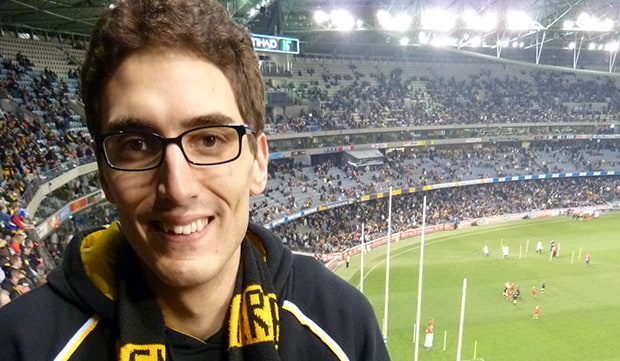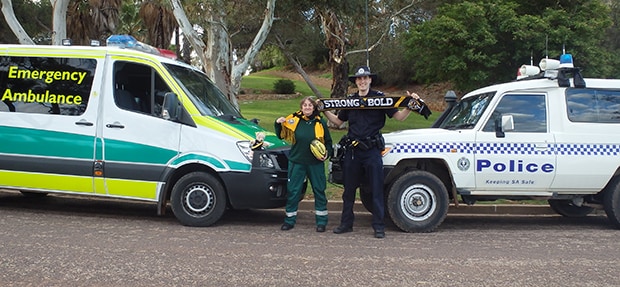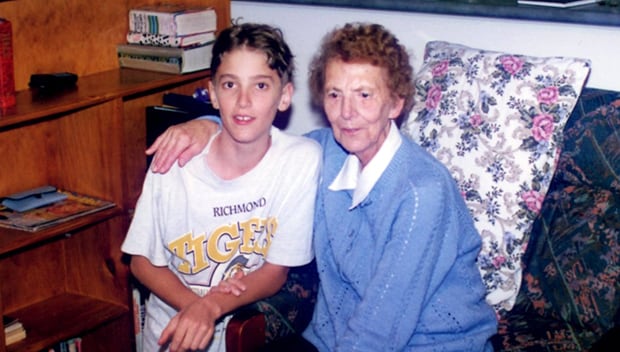Oh we're from Tigerland
Stories of being Richmond
RICHARD MILES, 28, PORT AUGUSTA
Favourite all-time player:
Matthew Richardson – “He personified how everyone felt about Richmond at the time, about dying for the yellow and black, but us always falling short. It broke our hearts, and it broke his, too.”
Favourite current player:
Ivan Maric – “I’m Ivan Maric all the way. He’s all heart. He really is a beacon for the team, such a leader. Some of his marks last Friday night were amazing. He’s such an athlete. He’s built for it.”
Last Friday night, Richard Miles caught snatches of Richmond’s game against Hawthorn on the radio from Roxby Downs, a mining town in dune country in remote South Australia. For most games this season, depending on his work roster, he’s watched from Port Augusta, at the very tip of Spencer Gulf, where for the past 18 months he’s been posted with South Australia Police.
This Friday night, there’s only one place he can be: with family, in his colours, as an off-duty constable in the outer at the Adelaide Oval. Richmond are playing. Richard needs to be there.
When the ball is bounced at 7.50pm (AEST) – 7.20pm Australian Central Standard Time – consider this: the silent companionship Richmond people in all parts of Australia, and in time zones around the world, have in sharing a tacit understanding of what it is to be a Tiger. For two hours of game time, so many of us will consume a common passion – for football, for Richmond – and a winter ritual of watching the game on television.
“The football is something to look forward to all week,” says Richard, of the emotional energy he invests in a game that usually is so far away. “Close matches are such an adrenaline rush, and if the Tigers win it sets you up for the week to come.”
Off duty: Richard in his colours at Etihad Stadium, on his annual pilgrimage east to see a Richmond game in Melbourne.
Richard’s passion for Richmond is a story about football displacement, the tyranny of distance, and family. “I was born into Richmond,” he says, of a barracking bloodline that began with his paternal grandmother, who lived in Coburg and caught the train often to Punt Road Oval to watch her heroes, Jack Titus and Jack Dyer. “It was only when we got to Adelaide that I realised I was different.”
With his father’s job transfer, Richard moved to the city of churches when he was five years old, in 1992, a fraught time to be a Richmond fan in Adelaide. The Crows were in their second season in the AFL, and home-town hysteria was at fever pitch. They finished ninth, beating the Tigers twice, including a 110-point walloping at the MCG in front of 10,291 spectators. Richmond finished 13th. Supporters were still licking wounds from the day Dunstall kicked 17 goals against us.
“Everyone in Adelaide barracked for the Crows. Those were the days of State of Origin football, and the ‘kick a Vic’ rivalry,” says Richard. “I remember going to school once in my brother’s Richmond guernsey on a casual clothes day, and even the teachers gave me snide remarks.”
Not that being an outsider has ever hindered Richard in his world viewpoint. Standing 198cm tall (“six, five and a bit in the old measurements”), he once played in the ruck for Adelaide Lutherans, one of the old remaining church teams in the South Australian amateur league. He also speaks fluent Indonesian, and has travelled often to central Java in a cultural exchange about which in 2010 he published a best-selling book, Bule Juga Manusia (“A Foreigner is Human, Too”).

Port Augusta's finest: policeman Richard Miles and ambulance officer Maxine Starks, displaying their shared passion outside of work, in regional South Australia.
Since graduating from the South Australia Police Academy two years ago, he opted for a placement in Port Augusta as an opportunity to engage in community policing among a large indigenous population. “All the indigenous boys really like Cyril Rioli. A lot of them go for Hawthorn and Essendon.”
The football, he says, is part of the social glue within many regional South Australian communities, as it is within the police force. “We’ve got people from all different teams at the station in Port Augusta,” he says. “St Kilda, Carlton, Brisbane, a couple of Geelong blokes, but I guess where we’re different from workplaces in Melbourne is that there’s a whole unit that goes for Port Adelaide and Adelaide.”
Richard says the force itself fields a formidable team, the South Australia Police Hounds. At the National Police Football Championships last year, held in Melbourne at Victoria Park, the South Australian constabulary won their fourth consecutive title. Games between each state-based police force are played for memorial trophies, named in honour of fallen officers.
Richard says the demands of his job, plus a rotating shift roster that means he sometimes misses watching Richmond’s games on live TV, have only deepened his connection with the game. “I’ve always enjoyed the footy, I’ve always made time for it,” he says. “But now I probably appreciate sitting down to watch a game a whole lot more.”
This Friday night, with a rostered week off, he will be at the game with his family. He says the football is something he’s always shared with his father, who talks often about Punt Road Oval and grand finals where he stood in the outer at the MCG to watch Richmond play. For fans like Richard, born into the longest premiership drought in a proud club’s history, the stories sound like a distant dream.
Family ties: A 12-year-old Richard with his paternal grandmother, from who the Tiger gene was inherited.
On Monday morning, we spoke about more immediate matters: what Friday night’s game might mean to Richmond, and how they might approach facing a club still grieving the tragic loss of its coach. Of all AFL clubs outside Adelaide, probably none has as many connections to Phil Walsh as Richmond does.
“Our team still has a job to get done,” says Richard.
“All those coaches at Richmond who shared a friendship with him did so through football, and football is what they loved. Maybe they’re observing his memory in the best way possible by just playing hard football. It’s all they can do. Honour him by playing the game the best they can.”
Go Tiges! Play a game of quiet respect this Friday night, away from home, with muted fanfare, with subdued celebration.
ENDNOTE: A story about football, life & death – Emma Quayle’s compelling account of how Richmond recruiting staff Blair Hartley, Matt Clarke and Luke Williams helped save the life of their Port Adelaide counterpart, Jason Cripps. Read the full story
If you would like to nominate a Richmond fan who has a story to tell about their barracking please email Dugald Jellie with details: dugaldjellie@gmail.com
www.tigertigerburningbright.com.au



